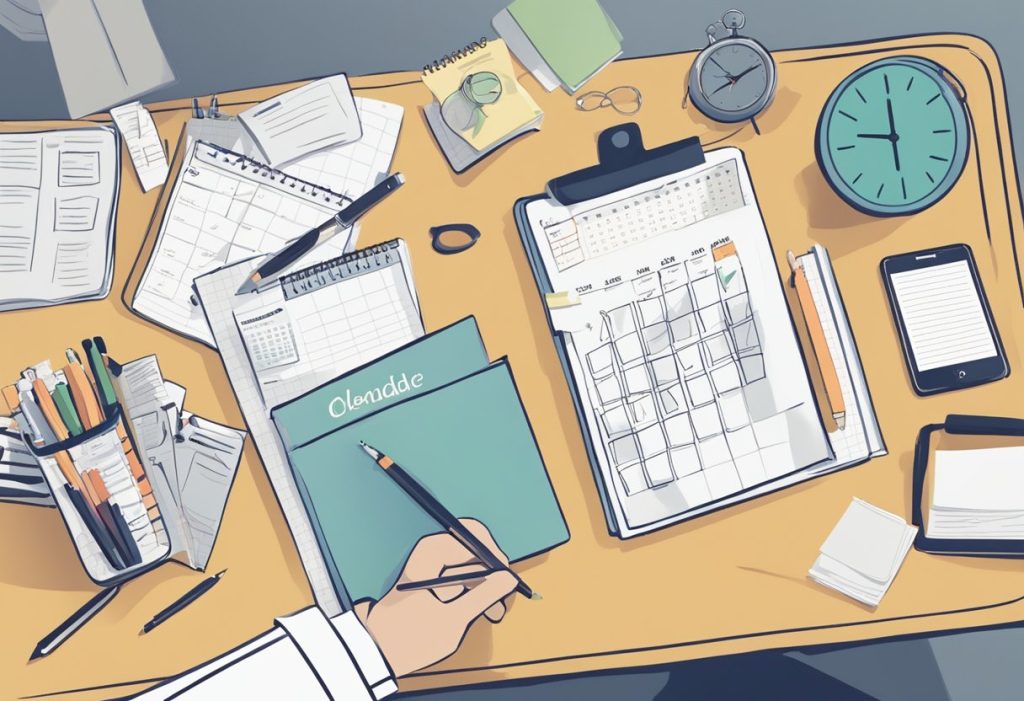Procrastination is a common challenge that many of us face, often leading to stress and a decrease in productivity. It involves delaying or postponing tasks, creating an invisible barrier to reaching our full potential. Despite its prevalence, it is possible to overcome procrastination through a variety of self-help methods. These tactics can empower us to take control of our habits, transforming our intentions into actions.
Self-help techniques for tackling procrastination revolve around understanding the triggers and employing strategies to navigate past them. Managing both external and internal distractions is crucial, as they can often derail our focus and commitment to tasks. Additionally, setting clear goals and breaking down tasks into manageable steps can significantly reduce the urge to put things off. Regular reflection on our progress and maintaining accountability can also fortify our resolve against the pull of procrastination, keeping us on track towards accomplishing our objectives.
Key Takeaways
- Strategies exist to transform procrastination habits into productive actions.
- Self-help techniques focus on understanding triggers and managing distractions.
- Reflecting on progress and accountability are essential in maintaining productivity.
Understanding Procrastination

Before we tackle strategies to overcome procrastination, it’s crucial to comprehend its psychological underpinnings and the reasons why we fall into this pattern of behaviour.
Psychology and Causes of Procrastination
Procrastination is not simply a matter of being lazy; it’s a complex psychological behaviour that affects many of us. Below, we outline the common factors that contribute to this tendency:
Perfectionism: We often procrastinate because we’re striving for perfection. This can lead to a fear of starting a task, as we worry it won’t be completed perfectly.
Fear of Failure: A powerful motivator to delay tasks, the fear of failure can paralyse us into inaction. It often stems from a worry that we won’t meet our own or others’ expectations.
Task Aversion: When we perceive a task as unpleasant or difficult, our inclination is to avoid it. This aversion can manifest as a strong dislike or a subtle inclination to do something else.
Stress: High levels of stress can impair our ability to tackle tasks effectively, often leading to procrastination as a coping mechanism.
Self-Esteem: Low self-esteem may lead to procrastination. We might believe we’re not capable of completing the task at hand, so we put it off.
Guilt: After delaying important tasks, feelings of guilt can arise. This guilt can become a cycle, where it both results from and contributes to further procrastination.
Boredom: When a task doesn’t engage us, we’re more likely to put it off in favour of more immediately rewarding activities.
Delaying Tactics: We’re adept at finding reasons to postpone tasks—creating a multitude of excuses or deciding to start after an arbitrary point in time.
Avoidance: In a bid to avoid discomfort, be it emotional or physical, we might choose to steer clear of certain tasks.
Tackling these causes requires introspection and a willingness to confront sometimes uncomfortable truths about our habits and mindsets. By understanding our personal procrastination triggers, we begin the journey toward more effective self-management and productivity.
Strategies for Overcoming Procrastination
We often struggle with postponing tasks, but by employing effective strategies, we can boost productivity and overcome procrastination.
Setting Clear Goals
We can start by setting clear and realistic goals. It’s crucial to define what we want to achieve within a specific timeframe. We need to ensure our objectives are SMART: Specific, Measurable, Achievable, Relevant, and Timely.
- Specific: Identify exactly what needs to be completed.
- Measurable: Set criteria to measure progress.
- Achievable: Goals should be attainable and not overly ambitious.
- Relevant: Ensure goals align with larger objectives.
- Timely: Assign deadlines to keep us accountable.
Improving Time Management
For better time management, we should embrace tools and techniques to organise our day. A calendar is vital for us to keep track of deadlines and appointments. Adopting the Pomodoro Technique—focusing on work for 25 minutes followed by a 5-minute break—can heighten focus and prevent burnout.
- Use a digital calendar to set reminders and view our tasks for the day, week, or month.
- Prioritise tasks by importance and urgency—tackle the ones that will have the biggest impact first.
- Schedule regular breaks to maintain our motivation and mental clarity.
Creating Effective To-Do Lists
We often underestimate the power of a well-structured to-do list. To create effective to-do lists, we should:
- Prioritise tasks based on their urgency and importance.
- Break large tasks into smaller, manageable ones.
- Review and update our lists regularly to reflect our current priorities.
By doing this, we’ll have a visual representation of our tasks, which can make everything seem more manageable and less overwhelming.
Managing External and Internal Distractions
In tackling procrastination, we must address the twin challenges of external and internal distractions. By understanding and controlling these, we increase our productivity significantly.
Handling Technology and Social Media
We often find that technology and social media can be significant external distractions. To mitigate this, we should set clear boundaries for our technology use.
Adjust Notifications:
- Emails: Turn off automatic notifications, and schedule specific times to check them.
- Social Media: Disable pop-up notifications, and allocate certain times of the day to browse through platforms.
Use Technology Wisely:
- Employ apps designed to limit our time on certain websites or distractions.
- Silence our phones or use ‘Do Not Disturb’ modes during focused work periods.
Social Media Management:
- Recognise triggers that lead us to unnecessarily check social media, such as boredom or stress, and replace them with a productive activity.
- Unfollow or mute feeds that do not add value to our goals or are frequent sources of distraction.
Environment Setup:
- Keep our workspace free from clutter. Invoke a ‘clean desk’ policy to minimise visual distractions and sharpen our focus.
- Organise materials for our tasks at hand, enabling a smoother workflow and reducing the impulse to divert our attention elsewhere.
Rewards and Consequences:
- Set a reward for ourselves upon completion of a task, like a break or a treat, to form a positive association with productivity.
- Conversely, have an awareness of the negative consequences of giving in to distractions, and use this to motivate us to maintain our focus.
By consciously managing these distractions, we empower ourselves to create an environment conducive to overcoming procrastination.
The Role of Self-Help Techniques
We recognise the power of self-help techniques to combat procrastination, focusing on addressing internal triggers and fostering a mindset conducive to action. These methods champion self-compassion and habit formation as cornerstones for improving self-worth and control.
Developing Self-Compassion
We can start by identifying our self-critical thoughts and consciously shifting to a kinder perspective. This approach nurtures our self-worth, allowing us to face tasks without the burden of negative self-judgement.
- Recognise triggers: Take note of when and why procrastination occurs.
- Reframe mindset: Replace self-criticism with supportive self-talk.
- Regularly practise: Embed self-compassion through daily affirmations.
Building Better Habits
We establish new routines by breaking tasks into manageable steps and rewarding progress to reinforce positive patterns. This steady change in behaviour lays the foundation for consistent self-control and minimises procrastination.
- Start small: Begin with easily achievable goals to build momentum.
- Consistency is key: Perform tasks at the same time each day to develop a reliable routine.
- Tracking success: Use checklists or apps to monitor and reward accomplishments.
By emphasising these strategies, our aim is to empower individuals to improve their productivity and overall quality of life through self-led change.
Evaluating Progress and Maintaining Accountability
In our journey to overcome procrastination, keeping track of our progress and staying accountable are vital steps. We establish clear expectations and hold ourselves responsible for meeting them.
Using Rewards and Maintaining Motivation
Rewards can be a powerful incentive for us to follow through on our tasks. After evaluating our performance and achieving a milestone, we might reward ourselves. This can be as simple as taking a short break or indulging in a favourite activity. It’s crucial to maintain a list of rewards that are both meaningful and reasonable, ensuring they reinforce our motivation rather than detract from it.
- Short-term Rewards: Perhaps after a day’s work, we download a new film to enjoy.
- Long-term Rewards: When we reach a significant milestone, maybe we plan a weekend getaway.
Incorporating motivation into our routine ensures we strive for mastery and prevents stagnation. We can use a simple table to track our progress and associated rewards:
| Task Completed | Reward Achieved | Date |
|---|---|---|
| Submit Report | Watch New Film | 30/05 |
| Finish Project | Weekend Getaway | 15/06 |
Seeking Professional Guidance
Sometimes, our self-help methods need a boost from professional guidance. If we find consistent difficulties in managing our procrastination, a therapist can provide structured support. Engaging with a therapist brings a fresh perspective and may help us uncover underlying issues contributing to our procrastination.
- Worksheets: Therapists often offer downloadable worksheets to help us track progress and understand our patterns of behaviour.
- Accountability: Regular sessions with a therapist keep us accountable, providing a structured environment to discuss challenges and celebrate successes.
By using these approaches to evaluate and maintain accountability for our actions, we set ourselves up for continued improvement and success.

